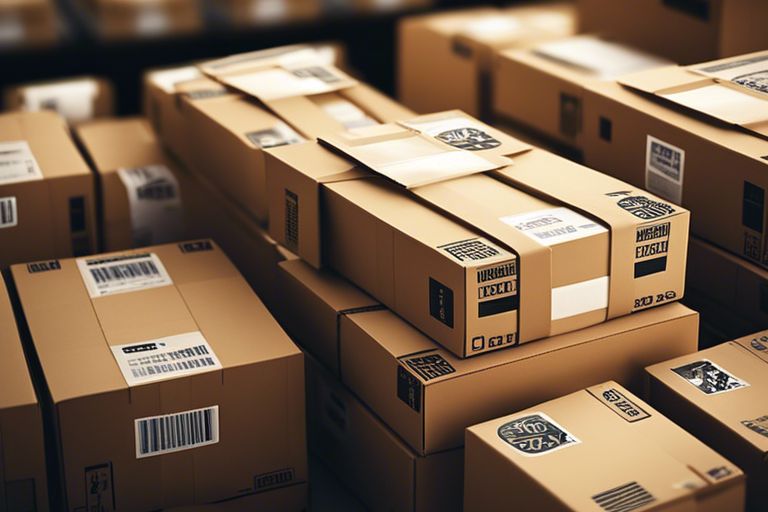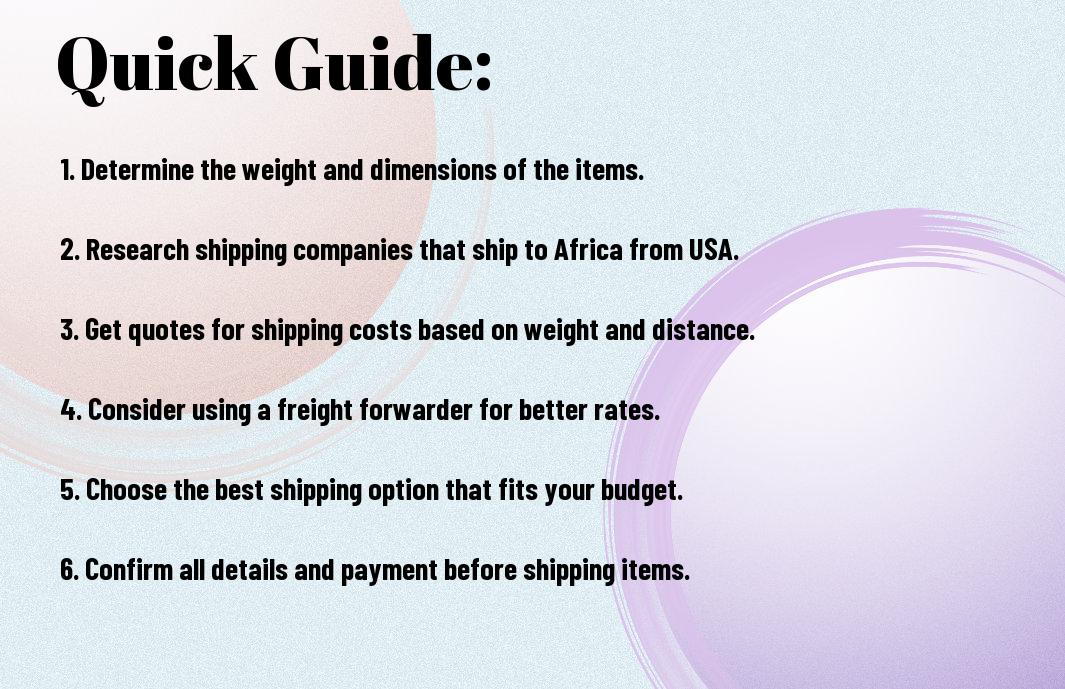Cost is often a significant factor to consider when shipping items from the USA to Africa. Understanding the various expenses involved can help you make informed decisions and plan your budget effectively. In this guide, we will break down the costs associated with shipping items to Africa from the USA, including shipping fees, customs duties, and any additional charges you may encounter along the way. By the end of this article, you will have a clearer picture of what to expect financially when sending items overseas.
Key Takeaways:
- Shipping Costs: Shipping items to Africa from the USA can be expensive due to the long distance and various shipping options available.
- Customs Duties: Additional costs such as customs duties may apply when shipping items to Africa, depending on the country and the value of the items being shipped.
- Shipping Time: Shipping items to Africa from the USA may take longer than domestic shipping, so it’s important to plan ahead and choose a reliable shipping option.
- Shipping Method: Choosing the right shipping method can impact the cost and speed of delivery, whether using air freight, sea freight, or expedited shipping services.
- Package Size and Weight: The size and weight of the package being shipped can affect the shipping cost, so it’s important to pack efficiently and consider consolidation options.
- Tracking and Insurance: Consider using shipping services that offer tracking and insurance options to ensure the safe delivery of your items to Africa from the USA.
- Local Regulations: Be aware of any local regulations and restrictions in the destination country in Africa to avoid delays or additional expenses during shipping.

Types of Shipping Options
The cost of shipping items to Africa from the USA can vary depending on the method of shipping chosen. There are several options available for sending packages overseas. Importantly, it is vital to understand the different types of shipping services available to determine the most cost-effective and efficient method for your needs.
Air Freight
There’s the option of shipping items via air freight, which is generally the fastest way to send packages internationally. Air freight is ideal for urgent deliveries or lightweight items. It offers quick delivery times but can be more expensive compared to other shipping options. Assume that you need to pay attention to weight restrictions and regulations when using air freight services.
Ocean Freight
Types of shipping options include ocean freight, which is a more cost-effective method for shipping items in bulk or large, heavy items. Ocean freight is generally slower than air freight but can be significantly cheaper, making it a popular choice for businesses or individuals sending large quantities of goods. A variety of shipping methods, including full container load (FCL) and less than container load (LCL), are available for ocean freight shipments.
A popular and more cost-effective method of ocean shipping is consolidating your items with other shipments in a container. This reduces costs by sharing the container space with other shippers.
Courier Services
You can also consider using courier services such as DHL, FedEx, or UPS to ship items to Africa. These services offer quick delivery times and real-time tracking of your shipment, making them a convenient option for sending time-sensitive items. Courier services are often more expensive than traditional shipping methods like air or ocean freight, but they provide added convenience and reliability.
Courier services typically offer door-to-door delivery, which can save you time and effort in coordinating the shipment of your items. They also handle customs clearance and paperwork, making the shipping process smoother and more convenient for the sender.
Postal Services
You may also choose to ship items to Africa using postal services like USPS or national postal services. While postal services are generally slower than courier services or air/ocean freight, they can be a cost-effective option for sending small packages or non-urgent items. You can choose between different shipping options such as regular mail or express services based on your delivery timeline and budget.
Shipping items via postal services may take longer compared to courier services, but it can be a reliable and budget-friendly option for sending items to Africa. Post offices also offer tracking services for international shipments, allowing you to monitor the progress of your package as it travels to its destination.
Factors Affecting Shipping Costs
Weight and Dimension
For shipping items to Africa from the USA, one of the key factors that affect shipping costs is the weight and dimensions of the package. Carriers typically charge based on the weight/volume of the package, so heavier and larger items will incur higher costs. It is imperative to accurately weigh and measure your items before shipping to avoid unexpected expenses.
Distance and Fuel Costs
Factors like the distance between the USA and African countries, as well as fluctuating fuel costs, play a significant role in determining shipping costs. Shipping items over a longer distance will naturally cost more, especially if fuel prices are high. It’s imperative to consider these factors when planning your shipments to Africa.
To accurately estimate shipping costs, consider using online calculators or reaching out to shipping companies for quotes based on the specific destination in Africa.
Customs Duties and Taxes
Costs related to customs duties and taxes can add a significant amount to your overall shipping expenses. Each country in Africa has its own set of regulations and fees when it comes to importing goods. It’s crucial to research and understand the customs duties and taxes of the destination country before shipping items to Africa.
Understanding and planning for these additional costs ahead of time can help you avoid delays and unexpected expenses during the shipping process.
Insurance and Liability
On top of the basic shipping costs, it’s also important to consider insurance and liability coverage for your items. Some carriers offer insurance options to protect your shipment in case of damage or loss during transit. Plus, understanding the carrier’s liability policies can give you peace of mind when shipping items to Africa from the USA.

Step-by-Step Guide to Shipping to Africa
Many individuals and businesses in the USA often find the process of shipping items to Africa daunting. However, with the right information and preparation, the process can be smooth and successful. Here is a step-by-step guide to help you navigate the complexities of shipping to Africa.
| Preparing Your Shipment | Choosing the Right Shipping Carrier |
| While preparing your shipment, make sure to package your items securely to prevent damage during transit. Additionally, research any restrictions or prohibited items for the destination country in Africa. | Choosing the right shipping carrier is crucial for the successful delivery of your items. Consider factors such as cost, transit time, and reliability when selecting a carrier. |
Preparing Your Shipment
While preparing your shipment, make sure to package your items securely to prevent damage during transit. Additionally, research any restrictions or prohibited items for the destination country in Africa.
Choosing the Right Shipping Carrier
Choosing the right shipping carrier is crucial for the successful delivery of your items. Consider factors such as cost, transit time, and reliability when selecting a carrier. It’s important to choose a carrier that has experience shipping to Africa and offers tracking options for your shipment.
Filling Out Customs Forms
Shipping
Customs
Tracking Your Shipment
Carrier
StepbyStep

Tips for Reducing Shipping Costs
Your quest to lower shipping costs when sending items to Africa from the USA can be aided by several strategies. By following these tips, you can save money on shipping expenses and make the process more efficient.
Optimizing Packaging
- Little adjustments in packaging can lead to significant savings in shipping costs. Use minimal packaging materials to decrease the overall weight of the shipment and choose smaller box sizes to avoid dimensional weight charges.
Using Consolidated Shipping
Now, one efficient way to save on shipping costs is by utilizing consolidated shipping services. This method involves combining multiple packages into one shipment, which can result in discounted shipping rates.
Using consolidated shipping can be advantageous as it allows you to benefit from lower bulk shipping rates. Additionally, this method reduces the risk of lost packages and streamlines the shipping process by dealing with fewer shipments.
Taking Advantage of Discounts
If you are a frequent shipper or sending items in bulk, you may be eligible for discounted shipping rates. Many shipping companies offer discounts to customers who meet certain volume or frequency requirements, so be sure to inquire about potential savings opportunities.
Packaging your items efficiently and accurately can also help you qualify for discounted rates. Consolidating multiple items into one shipment can help you meet minimum requirements for discounts and ensure you get the best possible deal on shipping costs.
Avoiding Peak Season Surcharges
Optimizing your shipping schedule to avoid peak seasons can significantly reduce your shipping costs. During busy periods such as holidays or special events, shipping carriers often impose surcharges or increase their rates, leading to higher expenses for senders.
Another way to save on shipping costs is by planning your shipments in advance and avoiding last-minute delivery requests. By scheduling your shipments during off-peak times, you can bypass extra charges and ensure your items reach Africa without breaking the bank.
Pros and Cons of Popular Shipping Carriers
| USPS (United States Postal Service) |
Pros
Cons
|
USPS (United States Postal Service)
Now for USPS, one of the pros is that they offer affordable shipping rates and a variety of options to choose from. They also provide flat-rate boxes for international shipping. However, a downside is that USPS tends to have longer delivery times compared to other carriers, and the tracking information may be limited.
UPS (United Parcel Service)
United Parcel Service (UPS) is known for its reliable and fast delivery services. They offer guaranteed delivery dates and have a strong tracking system in place. However, UPS shipping rates can be higher than other carriers.
With respect to choosing between different carriers, it’s vital to consider your budget, shipping timeline, and the level of tracking and insurance you require for your package.
FedEx
FedEx is popular for its fast and reliable shipping services. They offer a variety of shipping options, including express delivery for urgent shipments. However, FedEx shipping rates can be on the higher side compared to other carriers.
Understanding the pros and cons of using FedEx can help you make an informed decision when shipping items to Africa from the USA.
DHL
You can count on DHL for fast and efficient international shipping services. They are known for their excellent tracking system and timely delivery. However, DHL shipping rates may be more expensive than other carriers.
The reliability and speed of DHL’s services make them a popular choice for shipping items to Africa from the USA.
Common Challenges and Solutions
Delays and Lost Shipments
While shipping items to Africa from the USA, delays and lost shipments can be common issues. These problems may arise due to logistical challenges, customs processing times, or transport issues. To mitigate these issues, it is crucial to work with a reliable shipping provider that offers tracking services. Additionally, purchasing shipping insurance can provide protection in case of lost or damaged shipments.
Customs Clearance Issues
On occasion, customs clearance problems can cause delays in shipping items to Africa from the USA. This may include paperwork errors, missing documentation, or unexpected customs fees. It is necessary to ensure that all required paperwork is accurately filled out and submitted on time to prevent delays. Working with a customs broker can also help navigate any complex clearance issues.
This step is critical because failing to comply with customs regulations can result in items being held at the border or even confiscated. Being proactive and addressing any potential clearance issues beforehand can help streamline the shipping process.
Damaged or Missing Items
Customs inspection procedures can sometimes lead to items being damaged or lost during transit. To prevent this, it is important to package items securely and label them clearly. Including detailed packing lists can also help customs officials identify and process the contents of the shipment more efficiently. In case of damaged or missing items, it is necessary to report the issue to the shipping provider and file a claim for compensation.
Avoiding overpacking boxes and using sturdy packaging materials can help reduce the risk of items getting damaged during shipping. Additionally, labeling packages as fragile can alert handlers to take extra care when transporting them.
Communication Breakdowns
There’s always a risk of communication breakdowns when shipping items internationally. Misunderstandings due to language barriers, different time zones, or unreliable communication channels can complicate the shipping process. To prevent communication breakdowns, it is necessary to maintain clear and consistent communication with all parties involved. Utilizing email, phone calls, and instant messaging can help ensure that everyone is on the same page regarding shipment details and expectations.
For instance, providing tracking information to the recipient and keeping them updated on the status of the shipment can help avoid confusion or delays. Establishing open lines of communication with the shipping provider and customs officials can also help address any issues promptly.

To wrap up
Following this discussion on the cost of shipping items to Africa from the USA, it is evident that various factors influence the overall expenses. From choosing the right shipping method to considering customs duties and taxes, individuals and businesses need to weigh their options carefully to ensure cost-effective and efficient delivery. Additionally, leveraging technology and strategic partnerships can help mitigate some of the shipping costs associated with this process.
In a nutshell, while shipping items to Africa from the USA may involve additional expenses, proper planning and knowledge of the logistics involved can significantly impact the overall costs. By staying informed about shipping regulations, understanding the various fees involved, and exploring cost-saving strategies, individuals and businesses can navigate the process more effectively and ensure their products reach their destination in a timely and cost-efficient manner.
FAQ
Q: What factors determine the cost of shipping items to Africa from the USA?
A: The cost of shipping items to Africa from the USA is determined by factors such as the weight and dimensions of the package, the shipping method chosen, the destination in Africa, and any additional services required.
Q: What are the typical shipping methods available for sending items to Africa from the USA?
A: The typical shipping methods available for sending items to Africa from the USA include air freight, sea freight, and express courier services such as DHL, FedEx, and UPS.
Q: How long does it take to ship items to Africa from the USA?
A: The shipping time for items sent to Africa from the USA can vary depending on the shipping method chosen. Air freight can take a few days to a week, while sea freight can take several weeks to a month.
Q: Are there any restrictions on what can be shipped to Africa from the USA?
A: Yes, there are restrictions on what can be shipped to Africa from the USA. Prohibited items typically include weapons, flammable substances, and certain agricultural products. It is important to check with the shipping company for a full list of restricted items.
Q: How can I track my shipment to Africa from the USA?
A: Most shipping companies provide tracking services that allow you to track your shipment to Africa from the USA. You will typically receive a tracking number once your shipment is processed, which you can use to monitor its progress online.
Q: Are there any customs duties or taxes when shipping items to Africa from the USA?
A: Yes, there may be customs duties and taxes when shipping items to Africa from the USA. These fees are determined by the customs regulations of the destination country in Africa and are the responsibility of the recipient.
Q: What should I do if my shipment to Africa from the USA is delayed or lost?
A: If your shipment to Africa from the USA is delayed or lost, you should contact the shipping company or your chosen shipping service provider for assistance. They will be able to help track down your shipment and provide information on how to proceed in such situations.